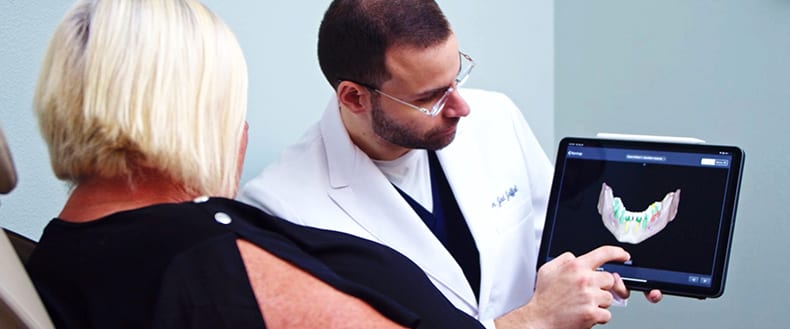 If you have one or more missing teeth, you are not alone. According to the American Association of Oral and Maxillofacial Surgeons (AAOMS), statistics show that 65% of adults between the ages of 35 and 44 have at least one missing tooth. Dental implants are the most effective, natural-looking form of tooth replacement. But before you ask Central Florida Oral, Facial and Periodontal Surgery for dental implants, what should you ask about them?
If you have one or more missing teeth, you are not alone. According to the American Association of Oral and Maxillofacial Surgeons (AAOMS), statistics show that 65% of adults between the ages of 35 and 44 have at least one missing tooth. Dental implants are the most effective, natural-looking form of tooth replacement. But before you ask Central Florida Oral, Facial and Periodontal Surgery for dental implants, what should you ask about them?
24 Questions to Ask Before Getting Dental Implants
Before getting dental implants, you will want to ask questions that help you understand your options, if implants are right for you, and what you can expect before, during, and after the procedure. Asking these questions will help you make an informed decision.
1. What Is a Dental Implant?
A dental implant is an artificial tooth that mimics the structure of a natural tooth.
Implant components include:
- Root form – A screw-shaped fixture, usually made of titanium
- Abutment – A connector attached to the top of the implant
- Restoration – A dental crown attached to the connector that replaces the portion of your tooth above the gumline
Dental implants replace missing teeth and support dental restorations, including:
individual crowns
a dental bridge
a partial denture or a full denture
2. Are Dental Implants Safe?
Dental implants have a long, well-documented history of success. Most implant root fixtures are made of titanium. Your jawbone fuses to the biocompatible “root” during a process known as osseointegration. Although titanium allergies are rare, if you have a metal allergy or sensitivity or prefer an alternative to titanium, metal-free zirconia implants are available.
3. What Is the Success Rate of Dental Implants?
The July 2014 issue of The Journal of the American Dental Association published research results that show dental implants have a 95% success rate. Researchers based the results on a study of three- to five-year outcomes for dental implants that specialists placed.
4. What Are the Advantages of Dental Implants?
The advantages of dental implants are many:
- Mimic natural teeth – Implants have the same structure as natural teeth. People will not notice your dental implants–just your smile.
- Improve the quality of life – No other form of tooth replacement feels or functions better. You can eat and speak with ease and smile with confidence.
- Prevent jawbone shrinkage – Implants stimulate the jawbone and help prevent bone shrinkage, which occurs when your teeth are missing.
- Prevent premature facial sagging – Jawbone preservation supports your facial muscles and prevents them from sagging and making you look older prematurely.
5. What Are the Disadvantages of Dental Implants?
They are not a quick solution for replacing missing teeth. Surgery, preparatory bone grafting if needed, and the healing process all take time. And implants have a higher initial cost than other forms of tooth replacement, but they are more cost-effective than the alternatives because they last much longer.
6. How Do Dental Implants Compare with Other Types of Tooth Replacement?
Dental implants, a dental bridge, a partial denture, and a full denture are all teeth replacement options in The Villages. But how do they compare?
- Dental implants – An oral surgeon embeds an artificial tooth root in your jawbone. Unlike a partial denture or a dental bridge, your adjacent teeth will not be affected.
- Dental bridge – A series of dental crowns—fused at the sides—replace one tooth or two or more missing teeth in a row. Replacement teeth are in the center of the bridge, and the crown on each end covers a natural tooth to anchor the bridge. But your dentist must shave down the healthy structure of anchor teeth. Otherwise, the crowns will not fit over them.
- Partial denture – A replacement tooth is embedded in a gum-colored base. Metal or plastic clasps on the ends of a partial denture hook onto the teeth adjacent to the missing one.
- Full denture – A full (complete) denture replaces an arch of upper or lower teeth. Suction holds an upper denture in place, and the lower denture rests on your gums.
Although a fixed bridge or a partial denture is less expensive than a dental implant, studies show that teeth located next to the prosthesis have a failure rate of up to 30% within five to seven years.
7. Am I a Candidate for Dental Implants?
Most people, except children whose jawbone is still growing and developing, are candidates for dental implants. But your oral surgeon will complete an evaluation to see if you qualify. Advanced dental implant technology, diligent post-operative care, and regular follow-up appointments help most patients receive implants, even if they have existing health conditions.
Chronic medical conditions – If you have controlled diabetes, high blood pressure, or another chronic medical condition, your implant surgeon will take precautions to promote a progressive recovery.
Periodontal (gum) disease – Gum disease and bone loss are treatable. Most patients with gum disease receive dental implants with success.
Currently wear dentures or have bone loss – If you have worn dentures for years, you might think you cannot get dental implants. But even if you are experiencing jawbone shrinkage, grafting can build up the bone and support implants.
Smoking – Nicotine and its by-products restrict blood supply and inhibit healing. But proper healing is a vital phase of the dental implant process. The Academy of Osseointegration recommends that you discontinue smoking at least two weeks before and two weeks after implant surgery and set a goal to stop smoking. Your oral surgeon will evaluate your case and explain when you should stop smoking for a successful outcome with implants.
8. What Happens During a Dental Implant Evaluation?
During an evaluation, your oral surgeon will review your medical, dental, and prescription histories. They will also examine the health of your teeth, gums, and areas where you need dental implants. The evaluation includes taking a three-dimensional (3-D), cone-beam computed tomography (CBCT) scan of your oral anatomy.
A CBCT scan is essential for several reasons:
- Identifies any oral health issues
- Reveals your bone structure and any areas of low bone density
- Determines the optimal location for dental implants
- Assists in developing a treatment plan
9. What Is the Dental Implant Process?
The process for receiving dental implants includes multiple steps. Each case is different, and you may not need tooth extractions or bone grafting.
A typical dental implant process includes:
- CBCT scan
- Tooth extraction if needed
- Bone grafting if needed
- Implant surgery
- Wearing a temporary crown or temporary denture from your dentist during the healing period
- Receiving your final dental crown or denture from your dentist
10. How Long Will It Take to Get Dental Implants?
The amount of time it takes to receive dental implants varies with each patient. No two cases have the same requirements for the number of appointments, procedures, and healing time. Your oral surgeon will develop a personalized treatment plan for you.
Some typical procedures in the dental implant process include:
- Tooth extraction – At times, a surgeon can immediately place implants after tooth extraction. But if you have an infection, your surgeon will treat it first.
- Bone grafting – If you need bone grafting, sometimes an oral surgeon will complete it at the time of implant placement. Otherwise, expect three to four months of graft healing time before you can receive dental implants.
- Implant surgery – After implant surgery, healing time is usually two to four months before receiving your final crown or denture.
- Final restoration – Your dentist will attach your crowns or dentures to implants.
A CBCT scan will help your oral surgeon determine which procedures will promote long-term success for your implants. Other treatment recommendations may involve your sinus cavities or gum tissue or include orthodontic treatment.
11. Will I Need Bone Grafting Before Dental Implants?

You will need bone grafting for dental implants if you do not have enough bone volume to anchor the implants. Jawbone shrinks progressively in areas where teeth are missing, so after taking a CBCT scan, your oral surgeon will know if you need grafting to receive dental implants.
The American Association of Oral and Maxillofacial Surgeons states that stabilizing a dental implant with bone grafts has other benefits, including improving function when you eat and chew and enhancing your smile.
12. What If My Body Rejects the Implants?
It is rare for a patient’s body to reject dental implants because titanium is biocompatible, and the jawbone readily fuses to it. But if you have an allergy or sensitivity to titanium, you can receive metal-free zirconia implants. If you practice diligent oral hygiene and keep your follow-up appointments, it will promote a healthy environment for your implants to succeed.
13. What Can I Expect Before Implant Surgery?
Your treatment plan defines what you can expect in the months and weeks before implant surgery.
Although the timeline differs with each patient case, here is an example:
- Months before – If you have low bone volume and need grafting, your oral surgeon will complete grafting before implant surgery. The type, amount, and extent of bone grafting you need will determine healing time, usually two to four months. Your oral surgeon will allow enough time for healing before placing implants.
- Weeks before – If you smoke, the best outcome requires that you stop smoking at least two weeks before surgery. Your oral surgeon will recommend when to stop smoking for your case.
- Days before – You will take antibiotics as prescribed by your oral surgeon. You will limit your diet after implant surgery, so prepare by shopping for appropriate food items.
- Hours before – Your oral surgeon will instruct you not to eat or drink anything, including water, eight hours before dental implant surgery.
14. What Happens During Dental Implant Surgery?
Your oral surgeon will sedate you before dental implant surgery begins. Computer-guided technology helps your doctor place each implant with these steps:
- Make an incision in your gums to expose the bone
- Create a precise opening in the bone for the implant to fit securely
- Insert an implant root form below your gumline and into the bone
- Suture the gum tissue around the implant
- Place a healing cap over the implant site
15. What Can I Expect After Implant Surgery?
After implant surgery, the healing process begins. Over the next few months, your jawbone and implant will fuse in a process called osseointegration.
Your oral surgeon will give you detailed post-operative instructions, but your role in promoting progressive healing includes:
- Diet – After implant surgery, you will drink liquids and eat soft lukewarm, or cold foods. Avoid sucking through a straw because it can dislodge the blood clot. During the rest of the healing process, you can return to a regular diet when you are comfortable. But avoid sticky, hard, or crunchy foods.
- Oral hygiene – Follow the guidelines to keep your mouth clean without disturbing the area around your dental implants.
- No smoking – Avoid smoking because it restricts blood flow and interferes with the healing process.
- Antibiotics – You will take antibiotics to prevent infection around your dental implants and bone grafting if you receive it.
- Activity – Avoid strenuous activity and exercise for three days after implant surgery.
- Follow-up visits – Your oral surgeon will schedule follow-up visits to examine the implant site and ensure it is healthy and healing correctly.
16. Is Dental Implant Surgery Painful?
Dental implant surgery is not painful. Your oral surgeon will sedate you and give you a local anesthetic for painless implant placement. After surgery, most patients receive relief from discomfort with Ibuprofen. But your oral surgeon will evaluate your case and anticipate the need for prescription-strength pain relief.
17. How Long Is the Post-Surgery Recovery Period?
The dental implant recovery period is an average of two to four months. Your bone and the implants fuse during the healing period to form a solid foundation for dental crowns or dentures.
18. Who Will Restore My Implants with Crowns or Dentures?
Your general dentist will restore your implants by attaching temporary crowns or dentures to them. After the healing period, your dentist will replace the temporary crowns or dentures with the final restorations.
19. How Long Do Dental Implants Last?
Dental implants can last 20 years or longer. They outlast other forms of tooth replacement, including a partial denture or a dental bridge. According to the American Association of Oral and Maxillofacial Surgeons, many dental implants placed by oral surgeons still function at peak performance after 35 years. Despite a success rate of 95%, some dental implants fail. Some contributing factors to dental implant failure include poor oral hygiene habits, uncontrolled diabetes, smoking, low bone density, and chronic gum inflammation.
20. What If My Implant Needs to Be Removed?
If your dental implant requires removal, your oral surgeon will evaluate the cause of dental implant failure and recommend treatment.
Depending on the cause of dental implant failure, treatment options may include:
- Restoring the bone with a graft, waiting until the area heals, and placing another implant
- Prescribing antibiotics to treat infection and restoring the bone surgically
- Additional treatment for severe gum and bone infections
21. How Much Do Dental Implants Cost?
The cost of dental implants varies with each patient’s case. Some factors that influence the cost include:
- Geographic location where you receive the procedure
- Number of implants you receive
- Surgical procedure and complexity, including tooth extraction, bone grafts, or implant placement
- Surgical materials
- Sedation
- Dental implant fixtures
- Restoration with dental crowns or dentures
You will receive a cost estimate for your treatment plan.
22. Will My Insurance Cover the Cost of Dental Implants?

Some insurance companies cover a portion of the cost of a dental implant procedure. Contact your insurance provider and ask if they provide any benefits. Also, speak with the billing coordinator at your oral surgeon’s office for information on payment plans and financing. Keep in mind that dental implants are a long-term solution for replacing missing teeth.
Consider how long dental implants last compared with other forms of tooth replacement:
- Dental implants: 20 to 30 years
- Full denture: 5 to 10 years
- Partial denture: 10 to 15 years
- Dental bridge: 10 years
23. How Do I Take Care of Dental Implants?
Take care of dental implants as you would your natural teeth.
- Individual implants – Brush your teeth twice daily and floss between them. Healthy implants need healthy gum tissue, so maintain good oral hygiene to preserve your implants.
- Fixed bridge – Gently floss between the bridge and your gums using floss designed for a dental bridge. A water flosser can help flush out debris beneath the bridge. Gently but thoroughly brush your teeth.
- Implant-supported dentures – Gently brush your implant denture with a non-abrasive toothpaste and a soft-bristle toothbrush. Use a water flosser to remove debris around the implant fixtures and between your gums and the denture base.
24. Will I Still Need Dental Cleanings and Exams?
Regular exams and hygiene appointments are vital to the success of your dental implants. A dental hygienist uses instruments designed to clean around dental implants and remove debris and plaque without harming the implants. A hygienist and dentist will examine your gum tissue around your implants to ensure they are free of inflammation and disease that lead to dental implant failure.
Get High-Quality Dental Implants in The Villages
At Central Florida Oral, Facial and PeriodontalSurgery, in The Villages, FL, you will receive dental implants of the highest quality. Dr. Jad Jaffal and Dr. Ronald Caylor are diplomats of the American Board of Oral and Maxillofacial Surgeons. Dr. Caylor is also a fellow of the American Association of Oral and Maxillofacial Surgeons. Our doctors adhere to the highest standards for dental implants—from planning to placement—to give you a successful outcome.
Call us or complete our contact form to request a consultation or an appointment for an exam.

